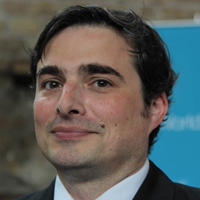
Mathias Bonk
Program Director of the World Health Summit at the Charité, Berlin
As a first-year medical student I travelled to India to work as a volunteer with the Missionaries of Charity in Calcutta. I was extremely fortunate to have had the opportunity to meet Mother Teresa. She told me I should work hard to help the poorest of the poor. Since then her children´s orphanage, Shishu Bhavan, has become something like a safe haven and a source of great inspiration for me. Here I have learnt a lot about health-care and how medicine is practiced in resource-poor settings, and about the various, often preventable, infectious diseases. To me it seemed to be unbelievable that so many children are still suffering and dying from diseases like diarrhoea, pneumonia and polio.
A few years later I returned to India for an internship in a hospital in Bangalore, Karnataka. During my rotation on the Emergency Intensive Care Unit, I met a 14-year-old boy, suffering from polio. He was not able to breathe by himself anymore and was being kept alive by a ventilator – a very costly procedure for his poor family already deeply in debt. His 12-year-old brother was taking care of him day and night, knowing that his brother’s death might be near. Still, he was full of compassion and hope. When I returned to the ward after the next weekend, the boy had passed away. His family had taken the critical decision order to save the livelihood of the other siblings.
After returning to Germany, I graduated from medical school and became a paediatrician. Vaccinations became part of my daily routine and nothing seemed to be more natural than to provide all children with the chance of a healthy start in life. The last polio case in Germany was seen in 1990 but it has taken decades and a multi-sectoral approach to reach this state. Today we are close to eradicate polio once and for all. The polio story is an impressive success story about the power of vaccination.
The GAVI Alliance has proved that a multi-sector partnership can achieve excellent results in a relatively short time. Its mission is to save children’s lives and protect people’s health by increasing access to immunisation in developing countries. The Alliance includes governments of developing and donor countries, WHO, UNICEF, the World Bank, Civil Society organizations, research institutions and vaccine producers. Each partner chips in, and working together the Alliance can reach goals none of the organisations could reach alone. 370 million additional children vaccinated since 2000, 5,5 million future deaths averted. Working together obviously pays off.
As the programme manager of the World Health Summit I am delighted that GAVI, a key player in global health and especially in the fight against child mortality, participated actively in the event ever since it was established in 2009 in Berlin. The World Health Summit pursues a similar goal: It brings people together to improve health all over the world. The annual World Health Summit is held under the high patronage of Germany’s Chancellor Angela Merkel, the French President François Hollande and the President of the European Commission, José Manuel Barroso. An academic network based on the M8 Alliance of Academic Health Centers, Universities and National Academies underpins its work.
In 2013, the World Health Summit will focus on the interplay between health and development, research and education, and on the role of health in many aspects of foreign policy. These interconnections are even more important in light of new and emerging health threats arising from increasing global mobility, demographic change and environmental pollution. A special focus will also be placed on global activities to eradicate preventable diseases such as polio.
On February 25, 2012, only about 10 years after my experience with the two brothers in India, the World Health Organization (WHO) eventually struck India off its list of polio-endemic countries. India hadn’t reported a single case of wild poliovirus for more than a year. This at least gives hope that other families will not have to suffer like the family I met in the hospital in Bangalore.
# # #
Dr. Mathias Bonk, a paediatrician with working experience in Germany, India and the United Kingdom and trained in Tropical Medicine and International Health, is the Program Director of the World Health Summit at the Charité in Berlin. In addition he is the Coordinator of the M8 Alliance of Academic Health Centers, Universities and National Academies, a collaboration of academic institutions of educational and research excellence that recognizes its responsibility to improve global health.
The World Health Summit 2013 takes place from October 20-22 in Berlin, Germany. GAVI’s Managing Director for Policy & Performance Nina Schwalbe will speak at two symposia at this year’s summit:
- Polio Eradication: Introducing IPV and Strengthening Routine Immunization
- Health in the (post 2015) Global Development Framework
